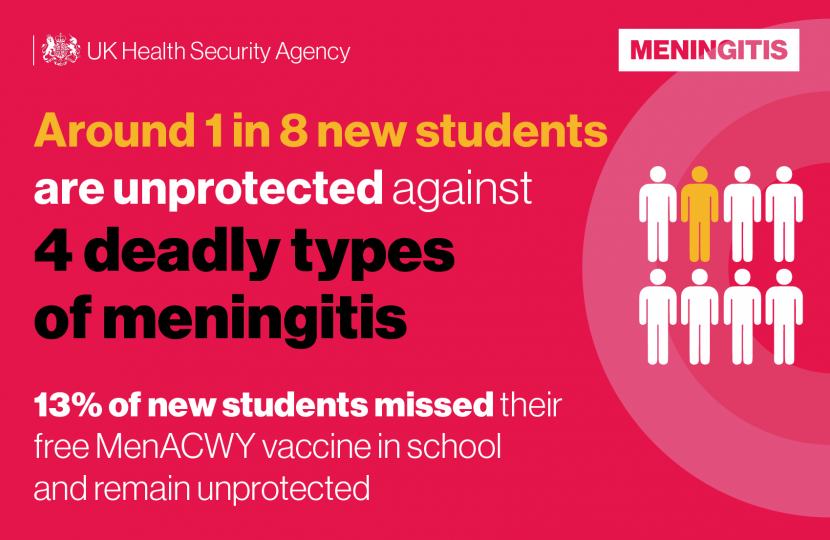
As many constituents take up university places across the country this autumn, I am urging all students to ensure they are up to date with all free routine NHS vaccinations via the NHS app and catch up with any they have missed.
The three vaccines students should be up to date with before starting university or college include:
- MenACWY – protecting against 4 common strains causing meningitis and septicaemia
- MMR – protecting against measles, mumps, and rubella
- HPV – protecting against human papilloma virus (HPV) related cancers such as cervical cancer and other cancers of the head, neck and genital areas, and genital warts.
If you have missed these vaccines at school, please contact your GP surgery to arrange a catch up.
The advice comes as data shows that around 1 in 8 new students heading to university this autumn are unprotected against 4 deadly types of meningitis - A, C, W and Y – which can cause long term disability, serious health complications and can even be life threatening. The NHS meningitis immunisation programme for schools is offered to all pupils in years 9 and 10. However, the latest 2021 to 2022 vaccine coverage data shows the vaccination rate has fallen to 79.6%.
All first-year students starting college or university this September and returning students who are not up to date with all their childhood and adolescent vaccines are at increased risk of serious diseases such as meningitis, septicaemia and measles as they mix with large numbers of other students from around the country and overseas. We are also urging students to know the signs and symptoms of meningitis and septicaemia as it could help save a life.
Meningitis vaccine
The meningitis vaccine is routinely offered to those in school years 9 and 10 but anyone who has missed out can still get a free jab with their GP until their 25th birthday.
The vaccine provides high protection against four common strains that cause meningococcal disease (meningitis and septicaemia) – MenA, MenC, MenW and MenY. However, it does not protect against all strains, such as MenB, which is often common among students. It’s therefore important to know the signs and symptoms as it could help save your own or a friend’s life.
Meningitis and septicaemia can develop suddenly. Symptoms include a blotchy rash that doesn’t fade when a glass is rolled over it, fever, headache, aching muscles and joints and a stiff neck. The MenW strain can also cause vomiting and diarrhoea in teenagers and young adults.
Urgent antibiotic treatment and hospitalisation is critical. If you have concerns for yourself or a friend, do not hesitate to seek urgent medical help.
MMR vaccine
Measles is a highly infectious viral illness that can also have serious consequences. It can be more severe in teenagers and young adults, often leading to hospitalisation. Measles starts with cold-like symptoms and sore red eyes, followed by a high temperature and a red-brown blotchy rash.
Two doses of the MMR vaccine are routinely offered to young children, but it’s never too late to get the jab if you’ve missed out. Check your red book or contact your GP surgery if unsure. Anyone can get the MMR vaccine from their GP at any age.
HPV vaccine
The HPV vaccine is proven to significantly lower rates of cervical cancer in women vaccinated at a younger age. The evidence clearly shows it helps protect against other cancers of the genital areas and anus, as well as some cancers of the head and neck. The vaccine works and will save lives.
The HPV vaccine is available routinely for girls and boys in year 8. If you’re eligible and missed out, it’s available for free at your GP surgery until your 25th birthday for:
- girls born after 1 September 1991
- boys born after 1 September 2006
If you missed the vaccine at school, contact your school nurse, school immunisation team or GP surgery to arrange a catch-up.


